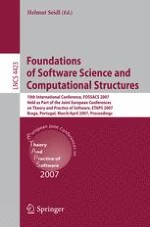2007 | Buch
Foundations of Software Science and Computational Structures
10th International Conference, FOSSACS 2007, Held as Part of the Joint European Conferences on Theory and Practice of Software, ETAPS 2007, Braga, Portugal, March 24-April 1, 2007. Proceedings
herausgegeben von: Helmut Seidl
Verlag: Springer Berlin Heidelberg
Buchreihe : Lecture Notes in Computer Science
